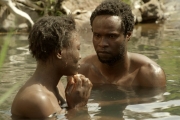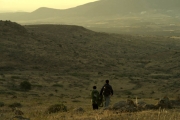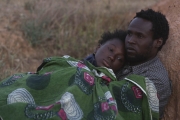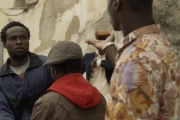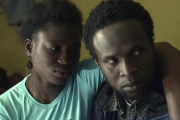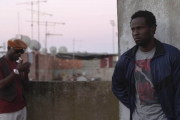![]() Presentation by actress Anny Romand
Presentation by actress Anny Romand
While crossing the Sahara desert, as they try to get to Europe, Léonard, a young man from Cameroon, rescues Hope, a Nigerian woman. In a fiercely hostile world where safety requires staying with one’s own people, these two try to find their way together, and to love each other.
• SACD Award, Semaine de la Critique, Cannes Film Festival 2014 •
Cast & Crew
Director • Boris Lojkine
Screenwriter • Boris Lojkine
Director of Photography • Elin Kirschfink
Producer • Bruno Nahon
Starring :
Justin Wang, Endurance Newton, Dieudonné Bertrand Balo’o, Bobby Igiebor…
Choose a picture to see the filmography (source : IMDB)
![]()
Why make a film on the world of migration?
I came to film via documentary-making, after ten years of studying philosophy. To me, making films was about leaving books behind to plunge into reality, to go far away and discover lives other than my own – more intense, more heroic lives. As far as I know, the world of migration has never been described from the inside. It is a terrible world, but a fascinating one, an underground world with rules of its own. In the cities that are stepping-stones along the way, each community has a ghetto, each ghetto its government, run by a chairman, with a police chief, a secretary general, police officers, a jail. The chairman is the leader of the community, he dispenses justice and maintains order, but quite often he turns into a mobster, demanding ransom from those who come his way. The situation of women is particularly terrible.
How did you cast the actors?
None of the actors in the film are professionals. All roles are played by real migrants who had never acted before. In order to find Leonard, I combed the Cameroonian ghettos in Rabat. For Hope, it was even more difficult, since the great majority of Nigerian women in Morocco are not free, they have “bosses”. [ . . . ] Shooting with non-professionals shattered everything that was too classical, too “written” in the script. The actors’ language – I ought to say “languages” since there is a dozen of them in the film – is astonishing, a mix of road slang and verbal invention. I would never have been able to make that up. But in some way the finished film has more of me in it than the script did.
What happened during the filming?
Filming brought together people who would never speak to each other. It was not always easy, but to see the Cameroonians and Nigerians getting to know each other, to see the Moroccans open up to the Black African world – that was very moving. It made the process more unpredictable, less controllable. But if a film is not an adventure, what is the point of making it?
Press Kit “Hope”
English & French ~ 3 pages ~ 306 Ko ~ pdf



